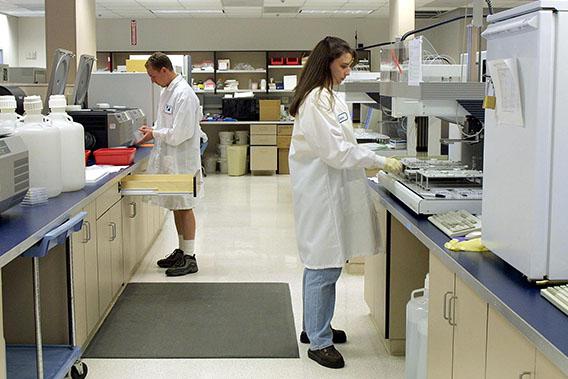I’m trying to remember if I have ever read a Supreme Court opinion by Justice Clarence Thomas with the pleasure I read the one he wrote this morning. For a unanimous court, Thomas did the wise and sensible thing and said no to gene patenting, when the DNA comes straight from nature. Companies can still patent synthetic DNA, because that requires alteration of the gene. Fine. Synthetic gene patents reward scientists for invention. And Thomas is also careful to limit the scope of the ruling so it’s clear that the court isn’t discouraging scientists from coming up with new methods for manipulating genes, altering them, or applying knowledge to them in new ways. That should calm the fears of the biotech industry—their sky is not falling.
But as Thomas explains clearly, the crux of today’s decision rejects the broad claims of Myriad Genetics. (Scalia wouldn’t join the part of the opinion explaining the molecular biology that’s key to this case, but to my inexpert eyes, Thomas’ description looked pretty good.) Hallelujah, because Myriad has been bad for women’s health. The company discovered two mutations of the genes BRCA1 and BRCA2 that are associated with a high risk of breast and ovarian cancer, and came up with a test for them. The bad part was that then Myriad tried to enforce a monopoly on that test by suing everyone else performing tests, based on its broad patents of the genes themselves.
Myriad charged thousands of dollars for its own tests. The company told me most women are covered by insurance, and they have done 5,000 free tests to low-income women without insurance. But that is just 0.4 percent of total cases, according to Duke University researcher Robert Cook-Deegan. When I asked readers about the cost of Myriad’s test, one wrote to me that her insurance wouldn’t cover it, and she couldn’t afford the cost of up to $4,000. “It is a horrifying feeling to be told you have a deadly disease and yet, a helpful and informative test will not be covered by your insurance company,” she writes. “I had to make a major health decision solely on financial reasons. Not a good feeling.” Another reader wrote of his epic saga trying to get testing for his wife before she died of breast cancer in 2009. “On the patient level, Myriad has monopoly pricing, and they refuse to license it to any other lab,” he said. “Besides the outrageous price, it is an insurance nightmare for patients.” All of this has enraged women’s health groups. (One major exception, as Peggy Orenstein points out, is the Komen Foundation, which gets money from Myriad, she says.)
Now Myriad will have to let other companies test for BRCA1 and BRCA2. The company’s doom and gloom prediction is that this will hurt women and science in the end by discouraging invention. Bah. I think the lesson is to watch out before enforcing a patent so aggressively that you infuriate fellow scientists and the people your product is intended to help. Myriad’s 20-year patents of BRCA1 and BRCA2 have almost expired, but its defeat will live on for other patent hungry firms. And there’s also this: The whole idea of patenting a gene—a piece of all of us, me and you—just doesn’t feel right. You can find something “important and useful” in nature, as Thomas puts it, without having the right to own it. The Supreme Court got it right today.
